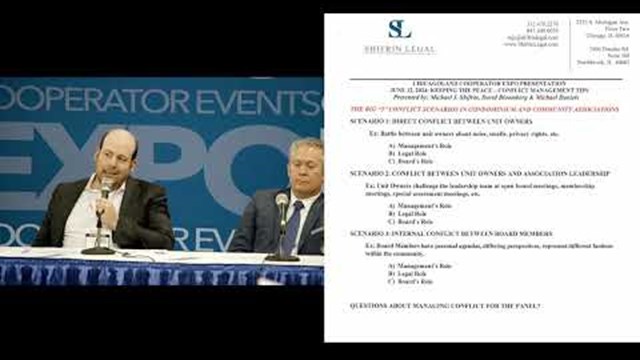
Q. My husband and I own a co-op. The rule book specifically states that the second-floor apartment must have 80 percent of each room carpeted and padded. Now we just got new tenants moving in above us. When they walk around up there, they are always very noisy. And they are up until 3 a.m. making noise and dropping heavy things on the floor right over our heads. I tried talking to management, which did nothing. Is there anything I can do or anyone else besides management I can talk to, to get these new tenants to obey the rules? They also take people’s parking in the lots whenever they want.”
—Complaining About the Noise
A. “You do not say whether you have reached out to your neighbors to discuss this,” says attorney Mark R. Rosenbaum, an attorney with Fischel & Kahn, Ltd., in Chicago. “Sometimes people are truly unaware of the effect they have on the people around them. Since you have to live together, and they are new to the building, approaching them to discuss the matter(s) may be the quickest way to resolve the problems you are having. But assuming you have reached out to your neighbors with no success (or are, for whatever reason, unwilling to so reach out) and assuming the board and managing agent are at least initially being unwilling to address the issue, you have few easy remedies.
“The board has a fiduciary duty to enforce the association’s documents. You say you have ‘talked’ to management about these issues. Simply ‘talking’ with management is often not enough to trigger a formal review of a problem. You should review your association documents and rules to determine the mechanism to trigger a formal review of the problems you are having. That may mean, for example, the filing with the association of a written complaint against the neighbors. Whatever the process, it should require the board and/or managing agent to at least investigate the issues and make a determination as to whether further action is needed. Starting up with the formal process may result in some formal, association-level action being taken against your new neighbors. Such formal action could range from fines to, in especially severe cases, forced sale of the neighbors’ unit. If no action is taken on your formal ‘complaint,’ the association rules may at least require the board/agent to respond to you with an explanation of why no action is being taken.
“If, despite taking the above steps, your association/management is unwilling to address the issues and won’t respond to you, you may still have some options. Depending on the state and/or city in which you live, there may be a governmental administrative agency to whom you can take complaints relating to association governance.
“If all else fails, you may have a cause of action against the neighbors. That would allow you to file suit. But lawsuits can be lengthy and expensive. And the exact damages here are uncertain. Your remedy may, instead, be an injunctive order framed to control the neighbors’ conduct. Depending on the state (and state law) you may not be able to recover your attorneys’ fees even if you win. A lawsuit may also not get you immediate relief. You may further have a claim against the association and/or the board members for breach of fiduciary duty for its/their failure to enforce the association documents/rules. But again, such a claim can be lengthy and expensive to fight.
“I note that, at least in Illinois, one thing you cannot do is refuse to pay your assessments until the association addresses the issues you have raised. The Illinois courts have made it clear that the obligation to make payment of assessments is independent of virtually all other issues you, as an owner, may have with the association.
“Overall, the law governing associations assumes the association and its management will do its job to handle matters internal to the association, or at least address complaints made. When complaints are being ignored, the association and management are not doing their jobs. In that case, there may well be no easy, inexpensive ‘magic bullet’ for an individual unit owner.”









Leave a Comment